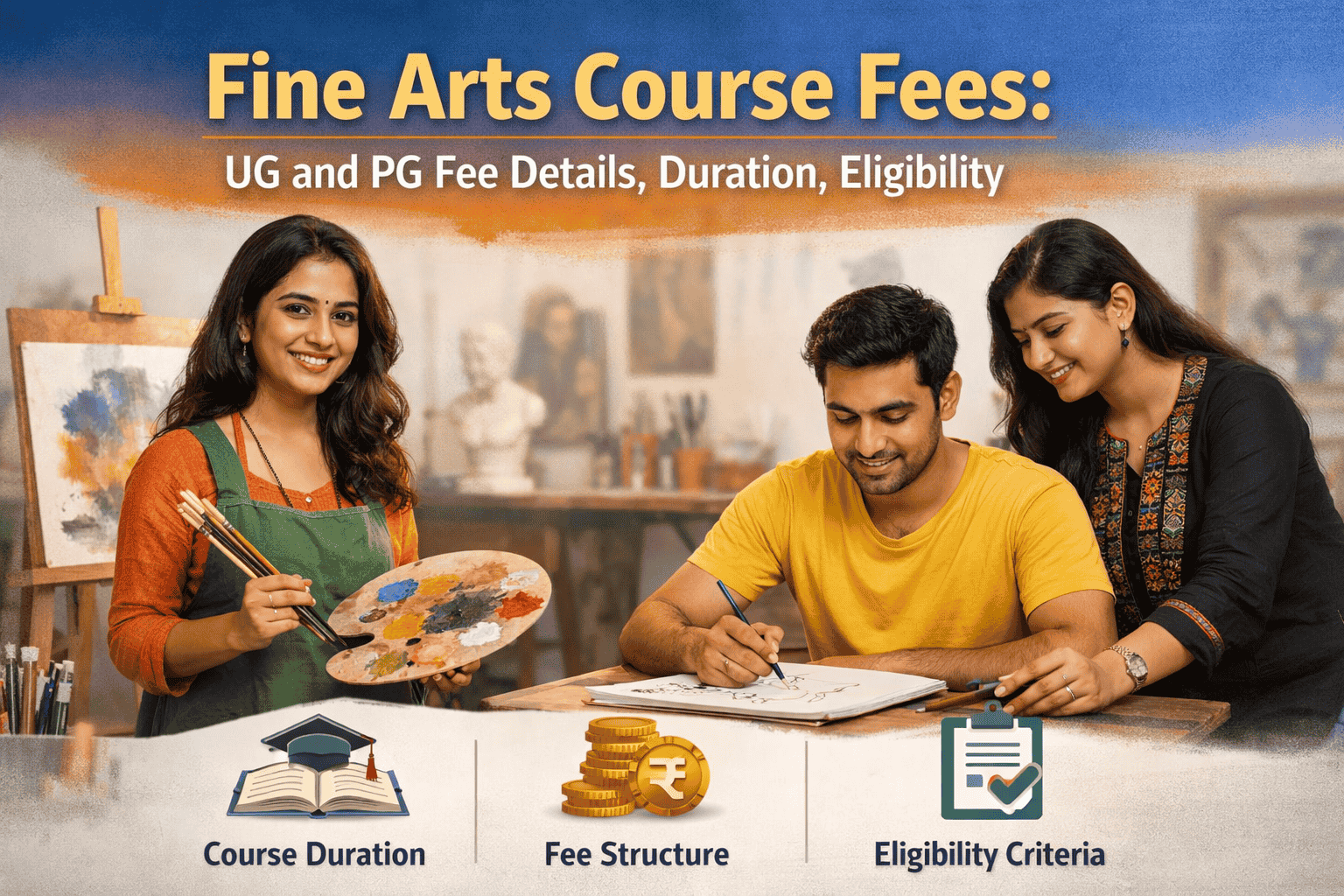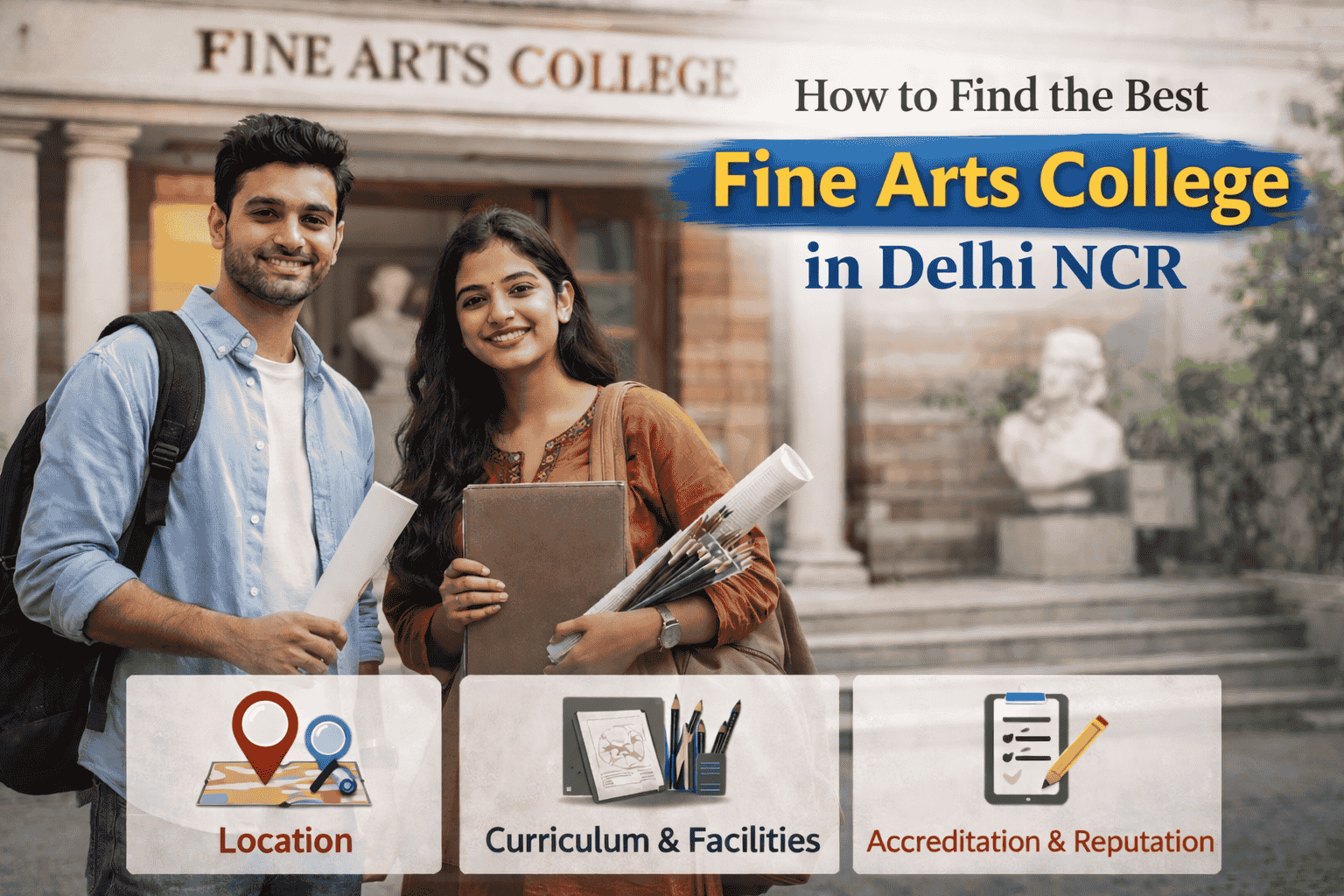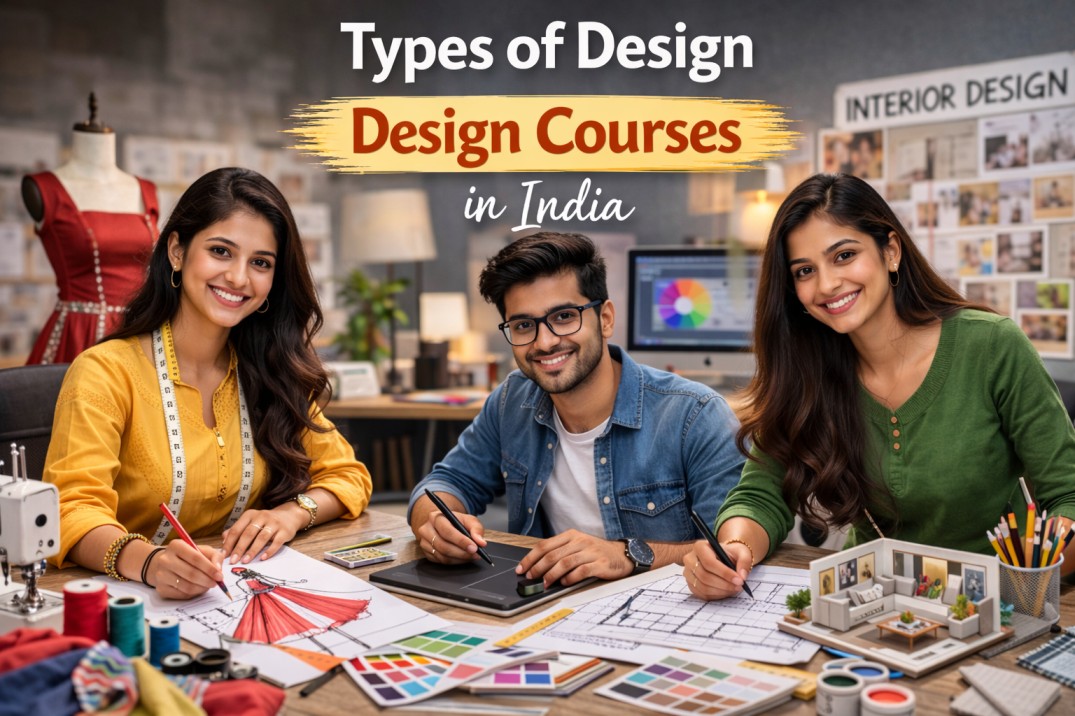Professional Courses After 12th Arts: Top Options, Eligibility, and Career
Imagine you step out of high school with ambitious dreams but unsure which career path to take. As of the CBSE report, there are 3.85 million students who have completed their Class 12 board exams in 2024.
Amidst those competitions, the next step can feel daunting! Arts students, in particular, often find themselves surrounded by myths about limited career choices.
However, the reality couldn’t be a lot different from the truth! The world of Professional Courses After 12th Arts opens doors to design, media, management, and other career choices, offering endless opportunities to shape your future.
In this blog, we will uncover the Best Professional Courses After 12th Arts, explore eligibility criteria, and guide you through potential career pathways that align with your passions and ambitions. Let’s dive into a journey of discovery and possibilities!
Why Choose Professional Courses After 12th Arts?
Professional Courses After 12th Arts are among the most popular students choices who are aiming to enrol for the undergraduate courses (UG). These courses come in a vast level of specialization to match the diverse academic interests and the student’s career aspirations.
For students who opted for class 12th Arts or Humanities, Professional Courses are often the next natural step at the level that matches the university curriculum. Here are some top reasons to choose Professional Courses after 12th Arts:
1. Natural Choice: For students who studied Arts in class 12, Professional Courses seem like the most logical next step. These programs allow students to continue with their knowledge and advance in the subjects they are most familiar with. They can specialize in a particular or specialized area, building on their learnt class 12 foundation. This enables a smoother transition and is more beneficial for their education.
2. Career Prospects: Professional Courses graduates gain diverse levels of comprehensive domain knowledge. This makes them well-suited for diverse career roles in the sector, such as in government and private organizations. They can find academically-aligned jobs that match their professional goals.
3. Soft Skills: Professional Courses equip students with the must-have soft skills that contribute to their overall development of personality and are valuable in various job roles. These skills include critical thinking, analytical ability, and effective written and verbal communication. By practicing these skills, graduates can look forward to growth in the career paths they have chosen.
Top Professional Courses for Arts Students After 12th
Professional Courses After 12th Arts are among the most popular choices for students who are aiming to enrol in undergraduate courses (UG). These courses come in a vast level of specialization to match the diverse academic interests and the student’s career aspirations.
1. Media and Communication Courses
Studying media and communication means you will keep up with the latest trends, technologies, and knowledge-oriented debates on a constant scale. These degrees are designed to prepare you for media-related careers and help you analyze the reflection of the media, represents, and global influence.
Moreover, media studies courses have varied content and approaches. However, most offer a practical training mix for various media careers and media representation opportunities from different perspectives. These include moral, political, and historical angles.

For example, while you might learn practical skills like film production or copywriting, you could also explore issues like how media represents gender, race, or specific cultures and political conflicts.
A slightly broader field, communication studies goes beyond the typical “media.” It explores all kinds of environments and communicational contexts related to humans. This field opens up various opportunities in business management, education, politics, and international relations, alongside journalism, marketing, and entertainment.
2. Design and Creative Arts Programs
These Professional Courses for Arts Students After 12th are perfect for students who are aiming for an art career or achieve a high level of specialized discipline skill. They are mainly programs that are practical-oriented and are designed to produce independently working graduates who later become artists and creative industrial professionals.
You can find both drama and performance, as well as in Fine Arts undergraduate and postgraduate programs. Programs related to Fine Arts offer drawing, painting, sculpture, photography, print-making, ceramics, gold and silversmithing, photomedia, jewelry design, and performance and installation, among other specializations. Additionally, there are graphic design, product design, textile, and fashion design programs as well.
Admission to these Professional Courses for Arts Students After 12th, at both undergraduate and postgraduate level, is based on a student’s talent and potential rather than their academic background.
Typically, you will need to submit your past work’s portfolio or application’s audition material. It’s important to note that each university has slightly different portfolio requirements, so be sure to check with a study options advisor before applying.
3. Business and Management Studies
Business Management Studies is all about learning about planning, executing, supervising, and analyzing businesses. It covers everything, ranging from production and finance to Human Resources (HR), administration, sales, and marketing. Essentially, it’s about getting the full toolkit for a company or organization that performs products or services.
You can enroll in this demanding field through various degrees, diplomas, and certification courses. If you have your 12th completed in any stream (Commerce, Science, or Arts), you can opt for BBA (Bachelor of Business Administration) or BMS (Bachelor of Management Studies) undergraduate courses.
In addition, if you are already a graduate, no matter what your background, you can deepen your postgraduate courses in the form of an MBA or Post Graduate Diploma in Management.
4. Social Sciences and Humanities
Often referred to as the Liberal Arts, the humanities and social sciences are academic fields with a major focus on behavior, culture, social constructs, and human society. While economics, psychology, and history are also covered in social science, the humanities emphasize mainly philosophy, languages and literature, and arts.
In these fields, students can strive for strong communication and critical thinking skills development alongside a profound understanding of cultural differences. These disciplines open doors to a wide range of industries and career paths. In addition, graduates can also find opportunities in social services, education, business, and media and communication.
Your educational level and study discipline play a deciding role in your career choices in Humanity and Social Science. Through an associate degree, you can begin your career through an entry-level role, such as a social work assistant, preschool teacher, or library assistant.
If you have an undergraduate or bachelor’s degree, you can easily choose education, media, communication, and business (among other fields). Depending on your major, you might become a Journalist, research analyst, or teacher. Those with a master’s degree can aim for the economist, political scientist, or school counselor, among other advanced roles.
Eligibility Criteria for Professional Courses After 12th Arts
If you are looking for a Professional Courses After 12th Arts course, it’s important to know its specific eligibility criteria. Make sure to thoroughly check the admission requirements before applying to your chosen or preferred university or college.
For courses at an undergraduate level, you need to have your 12th completed in any of the streams, like Science, Commerce, or Humanities, from a recognized board with at least 50% marks.
Typically, there is no age limit to take admission to these professional courses. Yet some colleges and institutes may ask for a minimum age of 18 years.
For postgraduate courses, you should have a graduation degree from a recognized college or university, with 50% as the minimum mark for eligibility.
Essential Skills for Success in the Arts Field
Art field success requires a blend of confidence, creativity, and resilience. Here are some key skills to help you thrive in this dynamic field:
1. Confidence and Communication Skills
Showmanship in acting, dancing, musical singing, or instrument playing can be nerve-wracking. It takes a huge confidence and self-esteem to step onto a stage and showcase your talent, knowing that you are inviting vast audiences’ judgment.
You need to remember that being nervous is natural for any aspirant. However, if you are a professional performer, you need to channel those nerves to make your performance more memorable and worthy.
If you need to level up your confidence, there are plenty of ways to build it. You can either become a spokesperson or leader (as a volunteer) in the university’s group projects. Join choirs, orchestras, dance troupes, or amateur dramatics groups, among other clubs, societies, or local groups. Entering regional competitions or talent contests can also help build your confidence.
2. The Ability to Network and Market Yourself
Many performing arts graduates are self-employed, and finding work often means auditioning. It’s crucial to be able to perform your abilities in marketing to potential employers. Networking is key to your name recognition and securing work in the future.
For this, you can join professional associations, attend events related to your course industry, and sign up for workshops, classes, and short courses to meet people who are like-minded. Follow the social media profiles of renowned musical directors, casting directors, and choreographers.
3. Resilience, Self-Discipline, and Stamina
The performing arts industry is intensely competitive and skilled. Therefore, rejection and criticism are the journey’s part. Resilience and tenacity are essential for coping with challenges and using them for your craft improvement.
Performing artists often rehearse for long hours before they are about to give their live performances so that they can give their 100%. In such a case, it is a must for a professional to have self-discipline and stamina. Moreover, the work can be highly mentally and physically demanding, especially if you are juggling multiple jobs to pay the bills.
4. An Analytical Mind and Creative Problem-Solving Skills
Those in the performing arts need an analytical mind to scrutinize and interpret roles, scripts, choreography, and music. This skill is also essential for critically analyzing your own performances.
You can develop this skill by reviewing university or professional productions, concerts, and recitals for academic publications, local media, or industry magazines.
5. Versatility
Performers need to adapt their skills to various roles, genres, techniques, and styles. Flexibility is about multitasking, and working part-time during your studies can help you practice balancing university, work, and personal commitments. Many in the performing arts have portfolio careers, often taking on additional jobs in teaching, arts administration, or technical roles.
Career Opportunities After Professional Courses in Arts
Pursuing the Best Professional Courses After 12th Arts can lead to various paths in career. Here are some exciting options to consider:
1. Journalist
Journalists play a pivotal societal role by helping people stay informed about current affairs and delivering the latest news. They assess leads, suggest story ideas, and conduct thorough research to ensure their output is unbiased.
To work for magazines, television, newspapers, or other media outlets, Journalists serve to not only report facts but also help in events interpretation and analysis, providing the public with much-needed information that is highly reliable and credible.
Their work often includes interviewing sources, attending events, and investigating stories, making each day unique and challenging.
Skills/Education Required: Ethical core, excellent communication, investigative skills, and networking abilities are crucial for this role.
2. Event Manager
Event Managers are instrumental in a wide range of events planning and execution. They bring creative ideas and suggestions to the table to ensure every event becomes a success. In addition, they work with clients closely to understand their vision and requirements.

From weddings to concerts and conferences, Event Managers work to handle logistics and operations seamlessly. This ensures that each event runs in a smooth fashion and meets the client’s expectations.
Skills/Education Required: Strong people management, organizational, and communication skills are essential for this role.
3. Graphic Designer
Graphic Designers craft visual concepts that enable consumers to inspire, stay informed, and captivate. They design templates and create images tailored for different businesses, contributing to brand development and identity.
These professionals closely collaborate with marketing and public relations teams to understand their vision and goals. This ensures a strong alignment of their visual content with promotional strategies and effectively communicates the intended message.
Skills/Education Required: Creativity, innovation, excellent IT skills, and attention to detail are vital.
4. Hotel Management
With significant growth in the hospitality industry sector, Hotel Management Professionals can easily thrive in the corporate landscape. They oversee the daily hotel operations to ensure optimal satisfaction and efficient services for the guests.
Read Also: The Role and Responsibilities of the Housekeeping Department In a Hotel

Additionally, they can venture into event planning, coordination and execution, hospitality and travel consultancy, and traveler’s planning services.
Skills/Education Required: Customer service skills and fluency in multiple languages.
5. Interior Designer
Interior Designers play a huge role in creating spaces that are aesthetically pleasing, instrumental, and functional. For this, they perform innovative design executions that not only meet but often exceed the expectations of the customers.
Read Also: How to Become an Interior Designer: A Step-by-Step Guide

These professionals work in a variety of spaces. These include homes, offices, and commercial establishments. This reflects the client’s style and needs while also considering the functionality and safety of the home or office spaces.
Skills/Education Required: Creativity, sketching skills, and up-to-date trends and design knowledge.
6. Teacher
Teachers are the foundation of the student’s educational process. They enable swift development and content delivery to facilitate seamless and engaging student learning. They work to monitor students’ progress attentively, providing feedback and assistance as necessary.
Beyond the classroom, they proactively plan educational events and activities that enhance the learning experience. They are also active participants in parent-teacher meetings to support student success through their collaboration.
Skills/Education Required: Outstanding communication, creativity, time management, problem-solving ability, and leadership qualities.
List of the Best Professional Courses for Arts Students
Exploring the List of Professional Courses After 12th Arts can lead to a fulfilling and dynamic career. Here are a few top professional courses to consider:
1. Degree in Journalism & Mass Communication
The B.A. in Journalism and Mass Communication program provides a deepened expertise in journalism and media. Here are the key aspects of the program:
a) Comprehensive Curriculum: The program covers modern theories and best practices in marketing communications, media theory, journalism history, ethics, visual journalism, documentary filmmaking, and public relations.
Read Also: AI in Journalism: Transforming the Future of News Reporting
b) Skill Development: You will learn research, writing, and story-producing concepts across various media platforms, further equipping you with the much-needed skills to become a successful Journalist.
c) Understanding Journalism: You will gain a profound understanding of journalism. This includes articles written and interviews conducted, as well as using different storytelling formats.
2. Bachelor of Business Administration (BBA)
The Bachelor of Business Administration (BBA) program is a course to equip you with essential professional business management, digital marketing, international business, and media management skills. Here are the critical aspects of the program:
a) Comprehensive Curriculum: This three-year Professional Courses After 12th Arts covers operations management, industrial laws, accountancy, human resources, and business software applications. You’ll also gain a deep understanding of entrepreneurship development through real-world projects.
b) Skill Development: Key takeaways include learning the importance of operations in management, understanding industrial laws, and recognizing the significance of accountancy in business.
c) Practical Learning: The program emphasizes practical learning. This prepares you as a financial advisor, media manager, human resource assistant, marketing executive, sales executive, advertising associate, digital marketing manager, or e-commerce marketing specialist.
3. Bachelor in Fine Arts (BFA)
The Bachelor of Fine Arts program helps students in concepts translation into individual expressions through drawing, color, form, space, structure, and composition. Here are the key aspects of the program:
a) Specialization Options: Key takeaways include the option to major in either Studio Practice or Art Theory. You’ll learn from a network of creatives and understand different areas of the art system.
Read Also: AI in Fine Arts: Redefining Creativity in the Digital Era

b) Confidence Building: You will gain confidence in your unique practice and place in the contemporary art space, learning alongside artists, designers, media practitioners, and curators. The dynamic campus environment encourages social and collaborative networking, with ample studio space for practice.
4. Diploma in Interior Design
The Interior Design diploma is a one-year postgraduate program that teaches students about impactfully creating spaces that are both beautiful and functional in diverse levels of settings. Here are the key aspects of the program:
Read Also: Diploma in Interior Designing After 10th: Courses, Fees, and Career
b) Skill Development: Some of the key takeaways include understanding the interior designing technicalities, learning furniture design fundamentals, and gaining practical experience with design software. You will also learn about the different materials used in furniture design and the Vastu Shastra’s complexities.
c) Career Preparation: The Professional Courses After 12th Arts prepares you for various design-related roles. These include site supervisors, Interior Designers, spatial designers, 3D visualizers, furniture designers, and lighting designers.
5. Bachelor’s in Performing Arts
The Bachelor of Performing Arts (Specialization in Music) is a four-year program designed to transform you into a skilled music performer and producer. Here are the key aspects of the program:
a) Comprehensive Learning: You will explore various domains such as Hindustani Classical Music, Western Music, Instrumental and Percussion Music, Folk Music, Digital and Analog Music Production, Sound Designing, Programming, Music Arrangements, Sampling, Audio Sequencing, and Mixing-Mastering.

b) Skill Development: Key takeaways include acquiring a comprehensive music understanding of its performance and production.
Tips for Choosing the Right Professional Course After 12th Arts
Choosing the Best Professional Courses After 12th Arts can feel daunting, but it’s a life-changing decision that can completely redirect your life to a completely new career path. Here are some steps to help you achieve:
1. Self-Assessment
Think about what subjects you enjoyed when you were in 12th standard and what topics sparked your curiosity. Are you good at writing, data analysis, working with people, or being creative? Consider your values, too. Do you prioritize a stable job, or are you more driven by making a social impact?
2. Research Different Courses
Explore various options in Arts, Humanities, Social Sciences, Law, Management, and Design, depending on the university. Look into course structures, syllabuses, and career paths associated with each. Use resources like university websites and career guidance websites in India to gather information.
3. Consider Job Prospects
Research the job market for different fields to see if there are opportunities and what the growth prospects are. Think about the work environment kind you prefer and whether it aligns with the careers you are considering.
4. Talk to People
Discuss your options with teachers, counselors, or professionals in your interest’s field. Get insights into the daily realities of different careers by talking to people who are already working in those areas.
5. Aptitude Tests
Consider taking aptitude tests to identify your strengths and weaknesses. This can help guide you towards suitable courses. These tests can provide valuable insights into what careers might be a good fit for you.
Conclusion: Build a Bright Future with the Right Professional Course
Choosing the right Professional Courses After 12th Arts can unlock vast opportunities in the world and set the foundation for a fulfilling career. By aligning your interests, skills, and aspirations with the right program, you can take confident steps toward your dream Arts profession.
We hope we have answered your questions about Professional Courses After 12th Arts, among others. For more information about the List of Professional Courses After 12th Arts, or if you are looking to enroll in any of our such courses, connect with our AAFT team today!
Remember, the journey you begin today shapes your tomorrow. So, embrace your passions, explore your options, and make a choice that leads to a bright and promising future.











